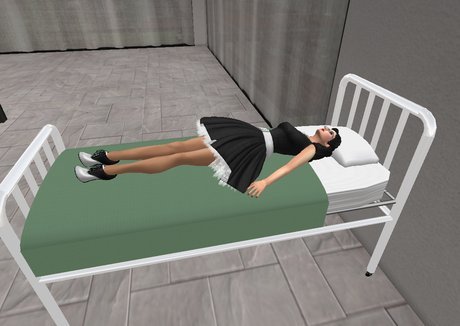Imagine a scenario in which you enter the hospital for routine, outpatient hernia surgery. You know you are brewing a cold (or worse), but you don't want to have to reschedule the surgery, so you don't tell your doctor you are getting sick. Your surgery is performed, and you go home. Two days later, you walk down the steps of your condo, wearing flip-flops. This is probably not a great choice of footwear for anyone with a lot of stitches in their abdominal area. You slip on uneven paving and split your knee wide open. You end up in the ER, where you receive 18 stitches and a severe warning to stay in your home and not leave.
You now, between both parts of your body, have many stitches. And you are aware that the "cold" you thought you had has turned into bronchitis. By the day after your fall, you ignore your doctor's orders to stay home and go to the ER for your coughing, which has now gotten completely out of control. You believe you have ripped out some of your abdominal stitches from coughing.
The hospital has decided that, in honor of your run of astonishing bad luck, they will experience a complete system-wide computer shut down. The ER becomes filled to capacity. People in advanced states of distress cannot even find chairs to sit on. You are placed in a wheelchair and wait for 10 hours to be seen. After four hours of waiting, your friend, who has accompanied you, leaves and drives to a store and comes with sandwiches and water. She is told that the rule in the ER is "No food or drink." You and she eat the food anyway, threatening to start a riot in the ER if your food is removed.
At the end of the 10 hour wait, you are seen by a doctor who runs tests and admits you to the hospital. Because the computers are still down, you are assigned a bed, but your name is never entered into the system. As far as the hospital is concerned, you do not exist. Concerned friends call to check on you and are told you are not a patient at the hospital.
You are given a breathing treatment, but no one looks at your knee wound or checks out your abdominal stitches. You lie in bed, unattended, except for the food trays, that arrive punctually, three times a day. You would rather have meds but, instead, are given limp broccoli and greyish meat.
Over 24 hours go by. You finally see a doctor, a "hospitalist," which means he is employed by your primary care physician to visit the hospital, since your doctor no longer does that. You have never met the hospitalist. He arrives with no records about your case. He asks you questions and writes your answers on a small piece of paper. You don't know him, and you don't know how he knew to visit you, since you don't exist.
You ask the hospitalist when you can go home. His answer is, "Ask the computer." You know that you would have better luck with a Ouija Board. The computers are still AWOL. Nurses are overworked, patients are surly. You can't ask for anything because you don't technically exist. Neither your mood nor the food improves.
By the end of the second day, computer service is restored to the hospital. An actual doctor who you actually know comes in to see you and you say to him, "Sit your fucking ass down so we can talk." He is startled, but sits down. You get everything off your chest. He listens. Your mood improves, but the food still does not.
Your close friend, Life in the Boomer Lane, has been there since the day you were admitted. She came in order to work on a revision of a book you and she and another friend had written. Instead of editing the book, the three of you have been sitting each day in your hospital room, making small talk and jokes about the food.
Your friends call the in-house Women's Patient Navigator for Outpatient Surgery person and tell her what has been going on. She is appalled. She visits you and immediately takes charge. You find out your lab test results and are told you are now in the hospital system. You exist. You believe this is what being born must be like, minus all the goo all over your body.
Your mood improves considerably. You trade your hospital gown for clothes your friends have brought to you. You sit up in bed and joke with the nurse who comes into your room. You order special meals from the hospital menu. You don't know that anything essential has changed, but you do know that the food tastes a lot better. For now, that is enough.

